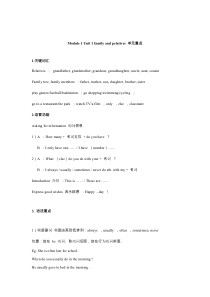 PDF
PDF
【文档说明】上海市六年级英语上册期末知识汇总(定稿).pdf,共(26)页,534.068 KB,由baby熊上传
转载请保留链接:https://www.ichengzhen.cn/view-80938.html
以下为本文档部分文字说明:
Module1Unit1familyandpelatives单元重点1.关键词汇Relatives:grandfather,grandmother,grandson,granddaughter,uncle,aunt,cousinFamilytree,
familymembers:father,mother,son,daughter,brother,sisterplaygames/football/badminton;goshopping/swimmi
ng/cycling;gotoarestaurant/thepark;watchTV/afilm,only,else,classmate2.语言功能Askingforinformation询问信息1)A:Howmany+名词复数+doyouhave?B:Ionlyhaveone……
/Ihave(number)……2)A:What(else)doyoudowithyour+名词?B:Ialways/usually/sometimes/neverdosth.withmy+名词Introduction介绍:Thisis……/Theseare……Ex
pressgoodwishes表示祝愿:Happy...day!3.语法重点1)频度副词频度由高到低排列:always,usually,often,sometimes,never位置:放在be动词、助动词后面,放在行为动词前面。Eg.Sheisoftenlatefo
rschool.Whendoyouusuallydointhemorning?Heusuallygoestobedinthemorning.2)人称代词单复数人称代词物主代词反身代词主格宾格形容词名词性单数Imemyminemyself复数weusouroursourselves单数youy
ouyouryoursyourself复数youyouyouryoursyourselves单数hehimhishishimselfsheherherhersherselfitititsitsitself复数theythemth
eirtheirsthemselves1.主格做主语,放在句首:Ioftengotothesupermarket.(me)2.宾格做宾语,放在动词、介词的后面:Isometimesgoshoppingwithhim(he)3
.形容词性物主代词做定语,放在名词前面:后面必须加名词Ourclassroomisverybigandclean.(we)4.名词性物主代词做主语、宾语、表语:后面不能加名词IsthisherTshirt?No
,hersisred.(she)Thatnewflatisours.(we)3)一般现在时:主语除了是三单主语是第三人称单数Igotoschoolonfoot.Shegoestoschoolonfoot.Idon’tgotoscho
olonfoot.Shedoesn’tgotoschoolonfoot.Doyougotoschoolonfoot?Doesshegotoschoolonfoot?Yes,Ido./No,Idon’tYesshedoes./No,shedoesn’t动词
变化①以s,x,ch,sh,o结尾+es;②以辅音字母+y结尾,去y+ies;③have…has3)(补充)名词的格(1)有生命的东西的名词所有格:a)单数后加’s如:Lucy’srulermyfather’sshirtb)以s结尾的复数名词后加’如:hisfrien
ds’bagsc)不以s结尾的复数后加’schildren’sshoesl并列名词中,如果把’s加在最后一个名词后,表示共有,如:TomandMike’scar汤姆和迈克共有的小汽车l要表示所有物不是共有的,应分别在并列名词后加’sTom’sandMike’scars
汤姆和麦克各自的小汽车(2)表示无生命东西的名词通常用“of+名词”来表示所有关系:如:apictureoftheclassroomamapofChinaModule1Unit2Ihaveagoodfriend单元重点1.关键词汇词性转换:friendn.……friendlya.……friends
hipn.helpn.v.……helpfula.……helplessa.kinda.……kindnessn.……kindlyad.pollutev.……pollutionn.discussv.……discussionn.usev.……reusev.……usefula.……u
selessa.angrya.……angrilyad.……angern.visitn.v.……visitorn.词组:talkto/withsbtalkaboutsth=discusssthliketodo/doingenjoydoingeverydayeverynight/
morning/afternoongooutatnightwalktoschool=gotoschoolonfootbetogetherplaytogethereatone’slunchshareone
’sfoodhelpeachothereachother=oneanotherhelpotherpeopleotherpeople=othersbelateforasksbaboutsthworkhardbekindtogetangrygetcoldsharesthwithsbtelllies
liveintheUSAvisitGardenCityforthefirsttimeonSaturdayafriendoftheEarthpickuprubbishlookafter=takecareof=careforallthethingsaro
unduspollutetheenvironmentair/land/water/noisepollutionkeep……cleankeep+adj;keepquiteputrubbishintorubbishbinsleaverubbishtellsbtodo;tells
bnottodoask,invite,allow,wantsbnottodowanttobewant/agree/deside/hope/offer/try/manage+todopromisetodo;promisenottododiscus
ssthwithsb2.语言功能1)A:Thankyou!B:Notatall./You’rewelcome./It’sapleasure./That’sallright.2)A:Wewanttolookaftertheenvironment.B:Allright.3.语法重点
1)Weliketo+v……together2)be+adj:Sheisalwaysnaughty/clever/friendly/helpfui比较:Shealwaysgetsangry.Shenevertellslies.3)A:Whe
rehaveyoubeen?B:Ihavebeento……A:Haveyoubeento___________yet?B:yes,Ihavejust/alreadybeento______./Yes,Ihavejust/alreadyb
eenthere.No,Ihaven’tbeento______yet./no,Ihaven’tbeenthereyet.4)wepromiseto.../wepromisenotto..Module1u
nit3spendingadayouttogether1.关键词汇词性转换happya.-------happilyad.-------unhappya.sandn.---------sandya.sunn.-------sunnya
.cloudn.--------cloudya.windn.------windya.rainn.------rainya.snown.------snowya.luckn.------luckya.------luckil
yad.------unluckya.actv.------activityn.------actorn.------actressn.------actionn.collectv.------collectionn.importanta.------importancen
.speciala.------speciallyad.词组:atweekends=onweekends=attheweekend=ontheweekend=attheweekendonweekdays在工作日Befarawayfrombene
arInsandybay/sunnytownonluckyislandComewithsbspacemuseumAphotoofsbthestudentsofclassthreeBuyticketseaticecreamHaveabarbecue/apicnic/lunch/dinners
pendaholidayFlyticketsridebicycles=cycleMakesandcastlecollectshellsMakeanalbumcomebackPlanavisitplantod
osthComebackmakesomenotesGettheregettoShanghaiMysixtiethbirthdayherninthbirthdayHaveabigbirthdaypartyhavea
goodtime=enjoyoneselfPlaywithsbgetenoughfoodfortheparty2.语言功能1)A:Let’sgotoOceanPark.B:That’sagoodidea./Allright.2)A:Wherehaveyoubeenin---
--?B:Ihavebeento----in---withsb3)A:Whichplaceshallwevisit?B:ShanghaiMuseumWhenshallwegothere?OnSaturdayWhattime---?9o’clockHowarewegoingtogetthe
re?ByundergroundHowmuchdoesitcost?=Howmuchisit?Howmuchdotheycost?=Howmucharethey?3.语法重点1)表示建议Howabout+n/d
oing?Howaboutplayingbadminton?Whatabout+n/doing?Whataboutplayingbadminton?Whynot+do?Whynotplaybadminton.Whydon’tyou+do?Whydon’tyouplayb
adminton?Let’s+do.Let’splaybadminton.2)现在进行时表示说话正在发生的动作或目前这一阶段正在进行的动作通常与:now,listen,look,thesedays,It’snine.搭配肯定句Wearehavingalesson.(am/is/are/+doi
ng现在分词)否定句Wearen’thavingalesson(am/is/arenot+doing)一般疑问句Areyouhavingalesson?(am/is/are+...doing)两种回答yes,weare/no.,w
earen’t特殊问句whatareyoudoing?Module2Unit4Whatwouldyouliketobe单元重点1词性转换:secreta.-------secretaryn.teachn.-------teachern.driven.-------drivern.workv.--
----workern.safen.a.-----safelyad.------safetya.firen.-------firemann.post.v.-----postmann.----postagen-----posterncookv.------cookn.-------co
okern.2词组:1.findoutPleasefindoutwhobrokethewindow.findAtlasthefoundhisEnglishbook.lookforAliceislookingforhernewwatch.2.inte
rviewsbinterviewher3.startwork4.finishwork5.putsthtogether6.sticksthonadisplayboard7.inthemorning/afterno
on/eveningOnacoldmorningonSundayafternoon/ontheeveningofJuly18.makeourcityasafeplacemakesthforsb=makesbsthmakeaca
keforus=makeusacakemakesb+adj.makemehappy9.eightyearsold10.Putout扑灭11.Putoneselfout1(tohelpothers)虽然对自己不利仍坚持做2使某
人失去知觉3.语言功能A.表达愿望(wishes)Wouldyouliketobeapoliceman?—Yes,Iwould./No,Iwouldnot.B.陈述原因(givereasons)Why……?Because……4.语法重点:A.I’d=Iwou
ld;wouldnot=wouldn’tB.wouldliketo与wantto的转换Iwouldliketobeanurse.=Iwanttobeanurse.Iwouldn’tliketobeanurse.=Idon’twanttobeanurse.Wo
uldyouliketobeanurse?=Doyouwanttobeanurse?Shewouldliketobeanurse.=Shewantstobeanurse.Shewouldn’tliketobeanurse.=Shedoesn’tw
anttobeanurse.Wouldsheliketobeanurse?=Doesshewanttobeanurse?5.职业Acookcooksfoodforpeople.Asecretarytakesnotesandanswersphones.Adentistlooksafterpeop
le’steeth.Adoctormakessickpeoplebetter.Anursehelpsmakesickpeoplebetter.Apilotfliesaplane.Ashopassistantsellsthingstopeople.Afactoryw
orkermakesthingsinafactory.Afiremanputsoutfires.Abankclerkreceivesmoneyandgivesmoneyinabank.Module2Unit5OpenDay单元重点1.词性转换:1.
enterv.----------entrancen.2.musicn.-------musicala.3.finala.--------finallyad.4.invitev.------invitationn.5.actv.--------activityn.6.dif
ferenta.----differencen.2介词:常用介词:in,on,at,behind等1.at表示时间概念的某一个点。(在某时刻、时间、阶段等)。at1:00(dawn,midnight,noon)在一
点钟(黎明、午夜、中午)2.on1)表示具体日期。注:(1)关于"在周末"的几种表示法:at(on)theweekend在周末---特指at(on)weekends在周末---泛指overtheweekend在整个周末d
uringtheweekend在周末期间(2)在圣诞节,应说atChristmas?而不说onChristmas?2)在(刚……)的时候。Onreachingthecityhecalleduphisparents.一到城里他就给父母打了一个电话。3.
in1)表示"时段"、"时期",在多数情况下可以和during互换,前者强调对比,后者强调持续。in(during)1988(December,the20thcentury)在一九八八年(十二月、二十世纪)3,词组搭配1.arriveat(小)in
(大)+地点getto+地点到达某地ArriveatschoolarriveinShanghaigettoShanghaireachShanghai比较:arrivehome/here/theregethomereachhome2.meet
sbat+地点meetMaryattheentrance3.visitsb/sp.VisitMr.Wang/visitBeijing4.lookatsb/sthlookatclassproject/lookatme5.listent
osb/sthlistentohim/listentothemusic6.theArtsandCraftsroomEnglishclubnoticeboard7.inthelibraryinthehallinthemusicroominclassroom6A8.haveteaandcakes
9.wantsbtodosthwantustomakenotes10.welcomesbwelcometheparents11.ontheopenday12.indifferentplaces13.onthesecondfloor1
4.teachers’office15.invitesbtodosthinviteLilytohaveapicnic16.takesomephotoscompletethearticle17.haveagoodtime=haveagreattime=enjoyoneself=enjo
yone’stime3.语言功能:A.询问信息(Askingforinformation)--WhenWhattimeWhereWhatWherewillkittybe?Kittywillbeinthemusi
croom.B.用副词表达事情得进展顺利。First…Next….Then…..Afterthat…..Finally…..4.语法重点:A.复习用介词表示时间:at2:40----twoforty/twentytothree2:30----twothirty
/halfpasttwo2:00---twoo’clock2:10----tenpasttwoB.掌握用介词表示地点Atschool,inourclassroom,onthefirstfloorC.一般过去时(twodaysago,last
week,yesterday,justnow,in1990,onMarch3,2006)Lindaplayedthepianoyesterday.Hewasathomeyesterday.Lindadidn’tplaythep
ianoyesterday.Hewasn’tathomeyesterday.DidLindaplaythepianoyesterday?Washeathomeyesterday?本课必须要掌握的过去式;Visit---visited
look----lookedlisten----listenedarrive---arrivedhave---hadModule2Unit6Goingtoschool单元重点一、词性转换:1、travelv.------t
raveln.--------travelern.transportn.旅行方式,交通车辆2、advertisementn.-------advertisev.做广告3、housen家,别墅-------housingn住宅--------housingestaten住宅区4、offi
cen--------officern官员,办事员----------officialadj官员的二、词组:1、travel同义词:trip,journey,tour2、bybus/ferry/taxi/car/lightrail/undergroundby+交通工具On
foot:gotoschoolonfoot=walktoschool3、farawayfrom翻译成:neareg.shelivesfarawayformschool.4、onone,swaytosp.eg.onhiswaytoschoo
l/library/cinema**onone,swayhome5、getonthebus/underground,getoffthebus/undergroundgetintothecar/plane/s
hip,getoutofthecar/plane/ship6、talkaboutsth,talkwithsbaboutsth7、onthebus/underground/lightrail/inthecar/taxi/ferry8、th
eamountof+不可数名词theamountoftimethenumberof+可数名词thenumberofstudents9、gettothesupermarketgetthere10、anadvertisemen
tboardpolicestation11、departmentstoresswimmingpool12、housingestate13、halfanhourhalfayearhalfpastfivehalfofthestudents三、语
言功能:A.询问时间:Howlongdoesittakesbtodo?Ittakessb.sometimetodosth.B.询问交通工具:Howdoyougoto···?Igoto···by···/onfootC.时
间状态从句:Sb.see(s).when···Heseesalotofflowerswhenheiswalkingtoschool四、语法重点:1、花时间买东西:Ittakessb.sometimetodosth=sb.spendsometime(in)doingsth例如:Ittakeshim
abouthalfanhourtogettotheoffice.Hespendsabouthalfanhour(in)gettingtotheoffice2、花钱买东西:Sbspentmoneyonsth=sbpaymoneyfor
sth=sbbuysthformoney=sthcostsbmoneyMaryspent50yuanonabag=Marypaid50yuanforabagMaryboughtabagfor50yuan=ThebagcostMary5
0yuan3、修饰名词的一些不定代词:没有几乎没有一些许多足够可数fewAfewMany/anumberof不可数littleAlittleMuch/anamountof都可noSome/anyAlotof/lotsof/plentyofenoughModu
le2Unit7Rulesroundus单元重点Ⅰ.词性转换1.rulen.规则……rulern.尺子2.quieta.安静的……quietlyad.安静地louda.大声的……loudlyad.大声地3.crossv.穿过……
crossingn.十字路口……acrossprep.穿过4.enterv.进入……entrancen.入口5.meanv.意思是,意味着……meaningn.意思Ⅱ词组搭配1.inthelibrary,intheclassroom,inthepark,ontheroad.2.onthe
left,ontheright,inthemiddle3.walkonthegrass4.leaverubbish5.waitforsb/sthwaitforthegreenman6.keep+形容词keepquiet7.drawo
nourdesks8.climbthetrees9.run/walkacross(prep.)theroad10.picktheflowerspickuprubbish11.turnleft/right12.enter(=comeinto)thecent
er13.leaveourbicycles14.theoneontheleft15.goupstairs/downstairs16.chaseeachother17.breaktherules/thelaw/
thepromisebreakavase/awindowhaveabreak(=rest)18.inthecircle19.belatefor20.intheshoppingcenter21.rulesroundusⅢ语言功
能A.Wheredowehaverules?……Wehaverulesinthelibrary.B.Whatdoesthissignmean?……Thissignmeanswemustn’teatordrink.C.Wherecanwefindit?……Wecanfinditinthelibrar
y.D.Wheremustweleavebicycles?……Wemustleavebicyclesontheright.E.Whichliftmustweuse?……Wemustusetheliftontheri
ght.Ⅳ语法重点1.情态动词(mod.v)1)情态动词表示说话人的情感、态度、语气,主要有:can(能够、可以),may(可以),must(必须),should(应该),need(需要),shall(征求对方意见),will/would(
请求“你(们)”做某事)等。2)情态动词的三个特征:没有人称和数的变化:HecanspeakEnglishverywell.直接构成否定句、疑问句:Hecan’tspeakEnglishverywell.CanhespeakEnglishwell?Yes,hecan./No,h
ecan’t.情态动词后面直接跟动词的原形:YoumaywatchTVonSaturdayevening.3)情态动词的几种特殊用法①用must开问的一般疑问句的肯定回答只能是must;但否定的回答有两种:mustn’t:不准、不允许/needn’t:不必E
.g.:MustIfinishmyhomeworknow?Yes,youmust.No,youneedn’t.Youmustn’ttalkloudly.=Don’ttalk.②must侧重于个人意志和主观上的必要,haveto侧重于客观上的必要③must+动词原形:表示说话人对现有状态
的主观猜测,表有把握的判断或推测,意思为“一定是……”E.g.:Hemustbeinthelibrary.Youknowhelikesreadingverymuch.④can’t用于表示否定的推理或猜测:E.g.:Hecan’tbeathomebecauseIsawhiminth
eclassroomjustnow.2.祈使句祈使句有两种(1)表示命令肯定句是动词原形开头的:Turnleft!Bequiet!Listentome.否定句是在前面加Don’t(不要):Don’tturnleft!Don’t
belate!Don’tlookoutofthewindow!祈使句的反意疑问句:Turnleft,willyou?Don’tbelate,willyou?(2)表示建议Let’sgoshopping,shallwe?
Wouldyouliketodo?3.保持愿意Youmustn’teatordrink..=Don’teatordrink.Module3Unit8Thefoodweeat单元重点1.词性转换Steamv.蒸、炖-------stea
meda.fryv.油炸油炒-------frieda.Boilv.用沸水煮-------boileda.bakev.烘烤-------bakeda.Freezev.-------freezinga.极度寒冷的-------frozena.
速冻的,冰冻的Freezingweather极度寒冷的天气frozenfood速冻食品Shop-------shopping购物shoppinglistshoppingcentershoppingmall2.词组搭配Wouldlikesth=wantsthWouldyoulik
e=DoyouwantAllright好吧my/his/yourfavourite某人最喜欢的Afterdinner晚餐后dinnermenu晚餐菜单Athome在家whatelse其他什么Findout找出bu
ythecheaperfood买更便宜的食物Inthemarket在市场inthesupermarket在超市Atthestall在摊位上inthesection在柜台上Thelistoffood食物清单thefooditem
食物项目Comparethepricesoffood比较食物的价格compareAwithBA和B比较Thinkofotherfood想想其他的食物apacketofdumpling一袋饺子3.语法重点1)A:Whatwouldyoulike…fordinner/lun
ch/breakfast?B:I’dlike…fordinner//lunch/breakfastA:Whatkindof…wouldyoulike?Wouldyoulike…or…?B:I’dlike……2)A:Haveyouboughtany…?B:Yes,Ihavebo
ughtsome…..A:Wheredidyoubuyit/them?B:Inthesupermarket/market,inthe…section/atthe…stallA:Howmuchwasit
/them?=howmuchdidit/theycost?B:It/They/was/were……=It/Theycost…..3)A:Canwehavesome…..?B:Yes4)need的用法作为情态动词(多用于否定、
疑问句)作为行为动词肯定句NeeddoNeedtodoNeedsth否定句Ineedn’tdoDon’t/doesn’tneedtodoDon’t/doesn’t疑问句NeedyoudoDo/doessbneedtodo
?Do/doessbneedsth5)also,too,either,aswell(too=aswell)1.too,also用于肯定句,too呀放在句尾,前面需要有逗号;also放在句中,刚在行为动词之前,be动词、助动词、情态动词后面2.either用于否定句,要放在句尾
e.g.I’dalsolikesomesoup=I’dlikesomesoup,too=I’dlikesomesoup,aswellIwouldn’tlikefriedeggswithbacon,eithe
rModule3Unit9Thefoodweeat单元重点1.词性转换Spicen.香料---------spicya.香辣的funn.乐趣乐事---------funnya.滑稽可笑的Saltn.盐---------sal
tya.咸的likev.喜欢---------dislikev.不喜欢2.词组Planapicnic计划一次野餐haveapicnic进行一次野餐Abottleof一瓶Abottleof一瓶果酱Apacketof一小包Apacketof
一小包坚果Apieceof一片、张Apieceof一张纸Abagof一袋abagofice一袋冰Gotothesupermarkettobuyfoodforthepicnic为野餐去超市买食物Spreadjamonthebread把果酱抹在面包上(don't)needsthfromsb(
不)需要东西(从某人)Enough+n足够的enoughmoney/time.enoughaapples/ballsTaste+a尝起来tastenice/good连系动词:look看起来smell闻起来sound听起来feel感到taste
:+aLookbeautifulsmellgoodsoundinterestingfeelsicktastenicePrepareforapicnic准备野餐getreadyfor=bereadyfor为。。。做准备3.语言功能1)A:Shallwe+v.?=let’s+
v.B:That’sagoodidea./OK2)A:Whydo/don’tyoulikeit/them?B:Ilike/don’tlike…because…(too)sweet/salty/spicy/so
ur/bitter/.3)A:Wouldyoulikesome…?B:Yes,please/No,thanks4)A:MayIhavesome…,please?B:OK,Hereyouare./Sure./Allright./Yes,you
may.No,youmaynot./I’mafraidyoucan’t5)A:howmuchmoneyhaveyougot?B:I’vegottenyuanA:Howmuchisit/doesitcost?B:Itis/costs…4.语法要点Some用于肯定句Ihavesomeorang
es?Some用于希望得到对方肯定回答的一般疑问句;用于邀请能够,请求Shallwehavesomesweets?Wouldyoulikesomeoranges?Wouldyouliketohavesomes
ausages?Can/mayIhavesomestrawberries?Any用于否定句:Thereisn’tanymilkintheglass.Any用于一般疑问句:Isthereanymilkintheglass?5.数词:基数词、序数词(1)1-20one,two,three,f
our,five,six,seven,eight,nine,ten,eleven,twelve,thirteen,fourteen,fifteen,sixteen,seventeen,eighteen,nineteen,twenty(2)21-99先说“几十”,再说“几”,中间加连字符。2
3→twenty-three,34→thirty-four,45→forty—five,56→fifty-six,67→sixty-seven,78→seventy-eight,89→eighty-nine,91→ninety-one(3)101—999先说“几百”,再加and,再加末两位
数或末位数;586→fivehundredandeighty-six,803→eighthundredandthree(4)l,000以上,先从右往左数,每三位数加一个“,”,第一个“,”前为thou
sand.第二个“,”前为million,第三个“,”前为billion1,001→onethousandandone18,423→eighteenthousand,fourhundredandtwenty-thr
ee6,260,309→sixmilliontwohundredandsixtythousandthreehundredandnine750,000,000,000→sevenhundredandfiftybillion序数词(1)一般在基数词后加theg.four→fourth
,thirteen→thirteenth(2)不规则变化one→first,two→second,three→third,five→fifth,eight→eighth,nine→ninth,twelve—twelfth(3)以y结尾的十位整数,变y为ie再加
thtwenty→twentieth,forty→fortieth,ninety→ninetieth(4)从二十一后的“几十几”直至“几百几十几”或“几千几百几十几”只将个位的基数词变为序数词。twenty-first,tw
ohundredandforty-fifth基数词转为序数词的口诀:基变序,有规律,词尾加上-th.一,二,三,特殊记,词尾字母t,d,d.八去t,九去e,ve要用f替。ty将y变成i,th前面有个e.若是碰到几十几,前用基来后用序。Module3Unit10Healthyeating单元重
点1,词性转换Healthn.--------healthya.-------------unhealthya.---------------healthilyad.Usuala.---------usuallyad.-----------unu
suala.Eatv.-----------eatingn.Favorn.----------favoritea.suggestv.----------suggestionn.HealthydietsfoodpyramidShowsbsth=showsthtosbS
howmeyourphotos=showyourphotostomeShowsbaroundspshowheraroundourschoolLiveinthecityinthecountrysideHaveanunhealthydietwork
inthegardenDosomeexercises=havesportsdosomeexercisesHavelunchwithsbstaywithsbForafewweeksbecomefitandhealthyOne…theother
…as+adj/adv+asImproveeatinghabitdrinkalotofwaterTaketurnsdoaquizGetright/wrongshoulddo/shouldnotdoToomuchspicyfoodeachcorrectan
swerHavesomeburgersforlunchgotobedWashyourhands1)weneedalittlesugar----------howmuchsugardoyouwant?2)Weneedplentyofvegetables------
---howmanyvegetablesdoyouneed?Howmuch提问不可数名词数量howmany提问可数名词数量3)Yourdietishealthierthanmydiet=MydietisnotashealthyasyourdietTomistallerth
anJack=Jackisn’tastallasTomJohnisfatterthanBen=4)形容词比较级,最高级的(一)、形容词的比较级1、形容词比较级在句子中的运用:两个事物或人的比较用比较级,比较级后面一般带有单词than。比较级前面可以用more,alittle来修饰表示程
度。than后的人称代词用主格(口语中可用宾格)。2.形容词加er的规则:⑴一般在词尾加er;⑵以字母e结尾,加r;⑶以一个元音字母和一个辅音字母结尾,应双写末尾的辅音字母,再加er⑷以“辅音字母+y”结尾,先把y变i,再加er。3.不规则形容
词比较级:good-better,beautiful-morebeautiful(二)副词的比较级1.形容词与副词的区别(有be用形,有形用be;有动用副,有副用动)⑴在句子中形容词一般处于名词之前或be动词之后⑵副词在句子中最常见的是处于实义动词之后2.副词比较级的变化规则
基本与形容词比较级相同(不规则变化:well-better,far-farther)例如:直接加--er–estSoftsoftersoftest/fewfewerfewest以e结尾加---r,----es
tLargelargerlargest重读闭音节双写最后一个字母,加---er,----estThinThinnerThinnest/wetwetterwettestHothotterhottest/redredderreddestFat
fatterfattest/bigbiggerbiggest辅音加y结尾的双音节,去y加---ier,---iestPrettyprettierprettiest/healthyhealthierhealthiest多音节在前加---
more---mostmodernmoremodernmostmoderninterestingmoreinterestingmostinterestingbeautifulmorebeautifulmostbeautiful5)副词比较级,最
高级的构成SlowlymoreslowlymostslowlyQuicklymorequicklymostquickly6)不规则比较级,最高级的构成原级比较级最高级Good/wellbetterbestBad/badlyworseworstLittlelessl
eastFarfarther/furtherfarthest/furthestMany/muchmoremostOldolder/elderoldest/eldest(四)用法原级SogoodtoobadveryclearquiteimportantRatherdifficultolden
oughasoftenasnotas/soeasyas比较级BiggerthanmuchbetterfarmoreusefulevenearlierStillgreateralittlelongerbetterandbetterMoreandmorei
mportanttheearlieryougetup,thehealthieryouareWhoworksharder,benorkitty?最高级Thefastestinourclassthetallest
ofthethreeThesecondlongestriveroneofthelongestriversamongthebestfilmsWhichisthebiggest,thesun,theearth,orthemoon?形容词副词同形:Earlyfasthar
dlate
 辽公网安备 21102102000191号
辽公网安备 21102102000191号
 营业执照
营业执照